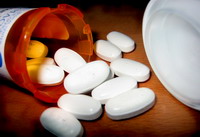Drugs analysis shows disastrous results
How can big safety issues go undetected in medicines taken by millions of people for years?

Or with devices like drug-coated stents, which were questioned last year after 6 million heart patients had already received them?
All fingers this week point to the U.S. Food and Drug Administration. From a company's labs to a consumer's lips, the chronically understaffed federal agency has the power and duty to keep dangerous products from harming the public.
But not the sole power. Increasingly, consumer groups, government whistleblowers and private scientists doing independent research are calling attention to safety problems the FDA has been slow to detect and resolve.
The Cleveland Clinic's cardiology chief, Dr. Steven Nissen, on Monday published an analysis suggesting Avandia raises the risk of heart attacks by 43 percent. He used information that Avandia's maker, GlaxoSmithKline PLC, published on a Web site to settle a lawsuit over another drug. The suit was brought by Eliot Spitzer, then New York attorney general and now governor - not the FDA.
The company disputes Nissen's study and says the drug is safe. Leading medical groups urge patients to talk to their doctors and not go off the drug on their own. Most experts say the risk of heart attack to any individual patient is small and that more studies are needed to be sure of the dangers seen in Nissen's analysis.
But any increase in the risk of heart attacks among diabetics - two-thirds of whom will die from heart problems - is particularly disturbing.
Congress plans hearings on the safety issue and the FDA's conduct. The Senate recently passed a bill aimed at strengthening the agency, but many think it does not go far enough.
"None of its provisions would necessarily have identified the cardiovascular risks" of Vioxx or Avandia, Drs. Bruce Psaty of the University of Washington and Curt Furberg of Wake Forest University wrote in an editorial in the New England Journal of Medicine.
Here are some questions consumers might have about drug safety:
Q. How did drugs like Vioxx or Avandia get approved?
A. Drugs typically are tested on small groups of people, and with narrow and sometimes flawed definitions of success. Such studies often are not large or long-lasting enough to reveal rare side effects.
In Avandia's case, the drug won approval because it led to short-term improvements in certain blood-sugar measurements whose true value as a sign of diabetes control some experts now question. The FDA did not insist on evidence of clinical benefit - fewer blood-sugar crises, hospitalizations, etc.
Q. How did the heart attack risk, if it is real, get missed?
A. Each individual study often is too small to reveal such a risk on its own. Proving that a drug causes extra heart risks in people already predisposed to heart problems, like diabetics, is especially tricky.
With Avandia, the risk only became clear when Nissen pooled results of 42 experiments Glaxo had done on nearly 28,000 people, comparing those who took Avandia to those who took no or other diabetes medicines.
Q. What can be done now?
A. The FDA acknowledges there is "an emerging safety signal" on Avandia, but says its own analysis of risks is inconclusive. If it finds harm, the agency could require the company to put a sharp warning on its label, restrict its use, do more studies, or suspend or stop selling the drug.
Q. What can be done to uncover risks of other drugs already on the market?
A. The FDA could require more companies to do further studies or keep a registry to track patients' experiences. However, enforcement is poor. From 1998-2003, only one-fourth of such required studies were actually completed by drug makers, Psaty and Furberg wrote. Nearly 900 remain pending - "a desultory approach," they said.
Q. What will happen next on Avandia?
A. U.S. Rep. Henry Waxman, chairman of the House Committee on Oversight and Government Reform, announced a hearing for June 6 and has asked the FDA commissioner, Glaxo representatives and Nissen to attend. Other panels also are holding hearings.
Q. What can consumers do?
A. Ask lots of questions and make health improvements that do not require medication. Many drugs fix one problem and bring on others. Getting enough exercise and eating a healthy diet remain safe and, in many cases, better alternatives to taking a pill.
Subscribe to Pravda.Ru Telegram channel, Facebook, RSS!





